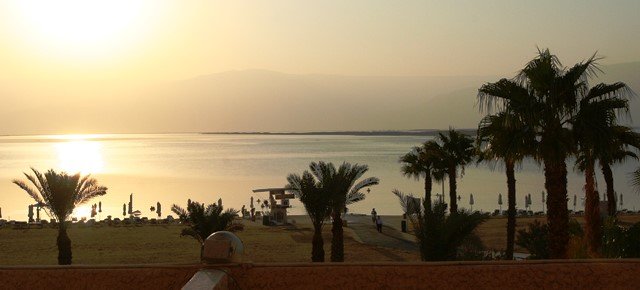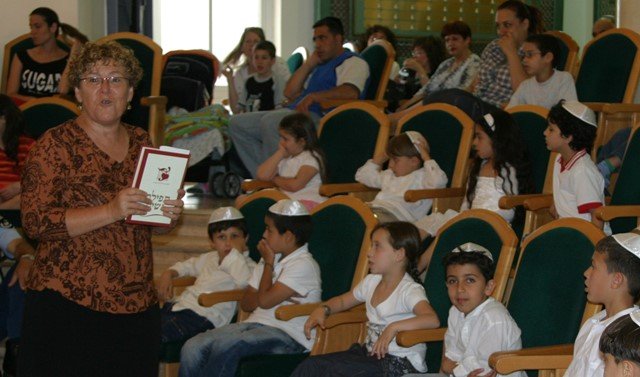Share This Story, Choose Your Platform!
Three findings are made about the tree that has been transplanted to streams of water: First, it yields fruit. Second, its leaves are green. And third, success is guaranteed.
“…that yields its fruit at the right time …” (Psalms 1:3b). – Rabbi Moshe Alshich[1] explained that one who is firmly rooted in the Torah, who deals with it day and night, is one who soaks his soul to bring forth fruit – just as Isaiah 60:21‑22 describes: “Your whole people are righteous ones. Forever they will possess [the] land. The branch of my planting, the work of my hands, for glorification. The little one shall become thousand. The young one a mighty nation. I am Lord, at the right time I will hurry.”
This text of Isaiah indeed offers a number of linguistic parallels with Psalms 1. There is talk of “righteous ones,” as in Psalms 1:6. There is the comparison of human beings with plants, and the statement that they are “planted” sprouts. And finally, the phrase “in its time” (בְּעִתָּהּ/be’eetah in Isaiah 60:22; בְּעִתֹּו/be’eeto in Psalm 1:3) springs to mind. Therefore it is not surprising that Isaiah 60 strongly influences the rabbinic interpretation of Psalms 1.
“Fruit” as distinguishing feature
Quite rightly, Martin Luther observes that even Christ, like the New Testament in general, names fruit as a distinguishing sign of the character of a human being.[2] “Every healthy tree bears good fruit. A diseased tree, however, bears bad fruit. It is impossible that a healthy tree will bear bad fruit, just as little as a rotten tree may yield good fruit.”[3]
First of all, the Bible refers to children as the “fruit” of humans.[4] This original, literal chain of meaning must not be overlooked in any interpretation of our text.
Therefore, it is logical that Amos Hakham[5] states: “The righteous will have sons who walk in his ways. If you take an offshoot from such a tree, it will take root and become like him.”[6] Previously, Radak[7] had already stated to our passage: “That’s the way it is with a good person: His sons and descendants will be like him.” And Malbim[8] wrote: “This tree has success in view of its seed. Everything that is sown by him or reproduced as an offshoot becomes like him. So too the righteous: His sons will succeed through his influence. In the land, his descendants shall be a lineage of straightforward and blessed people.”
Interestingly, according to Paul, a potentially capable church leader may be recognized by his children.[9] And so the Apostle also calls his own spiritual children “fruit”.[10]
“Fruit” in a figurative sense
But early on the image of the fruit in the Bible was transferred to what we obtain through our being, what grows out of our character. Thus, the Bible talks about the “fruit of works”[11]. Paul challenges his readers to lead a life worthy of the Lord, to please Him, and bring fruit in every good work.[12] Hakham wrote: “Yea, the man who murmurs in the Torah of the Lord and lives in His way does good works in the hour when they are needed.”[13]
In regard to good works, there should be no difference between Jews and Christians. Peter equates “lazy” with “barren” (2 Peter 1:8). Centuries earlier Jeremiah had warned his audience that the Lord would search for the fruit of human action and hold people accountable accordingly.[14]
Proverbs 12:14 parallels “the deeds of the hands” with “the fruit of the mouth.”[15] Hosea 14:3 wants to sacrifice “the fruit of our lips”. This is taken up by the author of Hebrews (13:15): “Through Him then let us continually offer up a sacrifice of praise to the [one and only] God, which is, the fruit of the lips that acknowledge His name.” Isaiah 57:19, finally, identifies God as “the creator of the fruit of the lips”.
Fruit of the Word of God
Throughout the Scriptures, there is talk of the “fruit of the Word of God.”[16] In the parables of Jesus, it is the hearers who accept the word and bear fruit (Mark 4:20/Luke 8:15) – which may well be understood as an echo of our Psalm. “To accept the word” may in practice quite well mean “to murmur the Torah day and night”.
Alschich says the fruits here in Psalm 1:3b are “new discoveries in the Torah,” which “makes every soul” “as allotted to her.”
Isaiah 59:21 describes the content of the future new covenant that God will make with His people: “My Spirit that is upon you and my words that I have put in your mouth shall not depart out of your mouth, or out of the mouth of your children, or out of the mouth of your children’s children,” says the Lord, “from this time forth and forevermore.”
Fruit of the Spirit
In stark contrast to the “barren works of darkness” (Ephesians 5:11) Paul describes “the fruit of the light” as “pure goodness, righteousness, and truth” (Ephesians 5:9). In his letter to the Galatians, he lists the “good” fruits as “the fruit of the Spirit”: “Love, joy, peace, patience, kindness, goodness, faithfulness, gentleness, self-control”.
Bad, inedible fruits on the other side are: “Sexual immorality, impurity, debauchery, idolatry, sorcery, enmity, strife, jealousy, anger, rivalries, discord, divisions, envy, drunkenness, orgies, and things like these”– “people who do such things will not inherit the kingdom of God” (Galatians 5:19‑23).
Fruit of righteousness
Isaiah 32:17 follows this train of thought: “The effective outcome of righteousness is peace, the consequence of righteousness, quietness and trust forever.” Actually, the term “fruit of righteousness” runs through the whole of Scripture.[17]
John the Baptist urged his audience to bring “worthy fruits of repentance” (Matthew 3:8/Luke 3:8). The author of Hebrews (12:11) recognized “peace and righteousness” as a “fruit of discipline.”
Isaiah 27:9 finally knows that a fruit can also be “that sin is taken away”. Jesus expected “fruit to eternal life” (John 4:36) and Paul as “fruit that you become holy; but the end is eternal life” (Romans 6:22).
“Fruitfulness,” as Charles Haddon Spurgeon stated, “is an essential quality of a gracious man”.[18] That is, a person who lives out of a living relationship with his Creator will more or less “automatically” bear fruit. He is, as Jesus told His disciples, “appointed to go and bring forth fruit.”[19]
Every human life will inevitably bear fruits. The question is whether these will “the fruit of pride” (Isaiah 10:12), “fruits of lies” (Hosea 10:13), “the fruit of sin” (Romans 6:21), or “fruit to death” (Romans 7: 1). Incidentally, in biblical thinking, barrenness may also be considered a “fruit” that allows conclusions to be drawn about the nature of a tree and ultimately lead to a curse.[20]
Or will the fruits of a human life be the result of preoccupation with the Word of God, ripen as fruit of the Spirit, fruit of righteousness and fruit to eternal life? In any case, the image of the fruit “emphasizes both the distinctiveness and the quiet growth of the product”.[21]
At the right time…
“…in the hour in which they are to be expected”[22]. At the time the Creator has appointed. And this time may vary significantly depending on tree species, climatic zone, location or current weather conditions.
“Fruit” is not something you could produce within a short time, on demand, as much as the age of discount supermarkets and globally connected commerce may convey this illusion. Fruit is always the result of a lengthy process.
Spurgeon knew something of how much this parable taken from an agricultural setting applies to a life of faith: “For though we know our interest in the promise, yet we are so tried and troubled, that sight sees the very reverse of what that promise foretells.”[23]
In fact, Jesus promised us that we will bear fruit (John 15:5). However, there is no promise from Him to His disciples that they will actually see their fruits. And when Jesus employs the parable of the grain of wheat (John 12:24) for Himself and for those who will take their cross upon themselves, the Messiah makes it clear that fruit sometimes only becomes visible when the wheat grain has long since died.
The Malbim counteracts that in Psalms 1 there is no mention of “herbs or greens,” “that gives only its seed and then passes away,” but of a tree that is allowed to bear fruits on its own every year.
In the same breath, this Jewish bible teacher, who sojourned in the Eastern Europe of the 19th century, also proves to be “imprisoned by hope”. In his choice of words, he refers to Zechariah 9:12, where the “prisoners of hope” are addressed. Malbim makes it clear that the Jewish people can only yield its fruit when it returns to the place from which it was taken. Separated from the land of Israel, the people of Israel will remain barren.
“…Its leaf does not wither …” (Psalm 1:3c). – It is important to some European, Christian exegetes that it is not about the outward appearance but about fruit. But then it is here in Psalms 1 actually also about the looks. After all, the first purpose for which God created the trees in the Garden of Eden was to be “lovely to look at” (Genesis 2:9). A quick look into God’s creation proves that the Creator loves the beautiful, the “feast for the eyes”.
That might give food for thought even to those pious ones, who pay little attention to their outward appearance. Whosoever comes along rather “withered” might be a bad testimony to the One from whom he receives everything, whom he calls “Father”, and who is ultimately responsible for him.
But it is not only the external appearance that may be considered “fruit”. The shade that a tree offers and the protection that goes with is one of the first and most distinguished fruits a tree may yield to the inhabitants of the sun-plagued Orient.
Amos Hakham writes: “Those who murmur in the Torah do good to humanity and offer their protection.”[24] That was the reason for Abraham asking for the righteous ones in Sodom (Genesis 18:23-32). The all-decisive question was then: How many righteous people are necessary to protect Sodom from the wrath and judgment of God?
Those who rebel against God are “like a garden without water”, and therefore “like an oak whose leaves wither”[25]. On the other hand, he who lives in harmony with his Creator “will not dry up.”[26]
By his very nature, a righteous human being points to the world to come which is as God originally imagined it. There will be trees whose leaves never wither, and whose fruit never run out. Rather, these trees bear new fruit every month because they are nourished directly from the presence of the living God. “And their fruit is for food, their leaves for healing”[27].
“That is the good person,” Radak explains, “people accept fruit and correction from him. From him they learn instruction (תורה/Torah) and good works.”
“And if one should ask,” Alshich takes up the logical objection of every realistic person, “if I murmur in the Torah day and night, when should I earn the support for my house?” – “To him be said,” “…and in all that he does, he is successful” (Psalm 1:3d). – Alshich understands this as, “with little effort, he will be economically successful in everyday life.”
If Malbim is right that a new content is communicated with each new wording of Scripture, then the “success” of a person is not just the “fruit” his life will yield. Then life is not just about fruit and good looks, but also about success.
In Deuteronomy 7:13 and 28:4,18 the “fruit of your womb” stands next to the “yield of your field.” In Deuteronomy 30:9 the “fruit” is parallel to “all the works of your hands.” Next to “fruit” and “green leaves,” “success” is one of the outstanding results of a life with the Torah. “He who deals with the Torah, his income will be successful for him” (Radak). And Ibn Ezra[28] comments on our passage without much circumlocution: “Wealth, sons and honor.”
Samson Raphael Hirsch[29] using his unique sense of language explains that the Hebrew word “צלח/tzalach” “denotes a progress that overcomes all difficulties.” Therefore in 2 Samuel 19:18 this verb is used to describe the crossing of a river.[30]
Hirsch observes a linguistic affinity of “צלח/tzalach” [to be successful] with “שלח/shalach” [to send], “to set something in motion. The צ[tz]-sound brings the nuance of overcoming opposition, and ‘צלח/tzalach’ thus means: to reach an objective by overcoming all obstacles.”[31]
Hirsch continues: “Maybe ‘סלח/salach’ [to forgive] is also related to it. The guilty person deserves to be inhibited in his way of life. Still allowing him to progress to a new future, to return him to this progression means: ‘סלח/salach’, to forgive.”[32]
Consequently, Rabbi Hirsch does not translate Psalm 1:3d with “‘He succeeds in everything he does’ but: ‘Everything he does he shall carry through to a successful conclusion.’ He does not owe his success in his endeavors to chance and the mere coincidence of external circumstances. It is by undertaking only that which is in accordance with the motives and goals set by God in His Torah, that he assures himself of success.”[33]
The Malbim explains: “There is a difference between ‘blessed’ and ‘successful’. ‘Successful’ one might be in secular eyes, in life in this world. ‘Blessed’ is one from a spiritual point of view, in life in the world to come.”
Somehow, according to these rabbinic interpretations, the praying believer of Psalm 1 seems to have already had a presentiment of what the Apostle Paul finally got to the point: “We know that for those who love the [one, true] God all things work together for good” (Romans 8:28).
In any case, Psalm 1 is in complete keeping with the meaning of Jesus’ statement in Matthew 6:33: “Strive above all for the kingdom [of the one, true, living God] and for His righteousness. Then all these things shall be added unto you.” Thus, “the call to think hard about the will of God is not merely for the recluse, but is the secret of achieving anything worth while”.[34]
Footnotes:
[1] (1507/08-1593), also called “the holy Alshich”, came from Adrianople, the Turkish Edirne, not far from today’s border triangle Turkey-Bulgaria-Greece, where he studied at the Talmud school of Rabbi Josef Karo. In 1535 he emigrated to the land of Israel and settled in Tzefat in Upper Galilee. When his teacher Josef Karo followed one year later, he was already one of the rabbinical judges in the city. Alshich excelled as preacher and interpreter of Bible and Talmud. Legend has it that his son was abducted as a child and became a Muslim. Alshich is buried in Tzefat, where in the old city today a synagogue still bears the name “Beit HaKnesset HaAlshich HaKadosh”.
[2] Johann Georg Walch (hg.), Dr. Martin Luthers Sämtliche Schriften. Vierter Band. Auslegung des Alten Testaments (Fortsetzung). Auslegung über die Psalmen (Groß Oesingen: Verlag der Lutherischen Buchhandlung Heinrich Harms, 2. Auflage, 1880-1910), 237.
[3] Matthew 7:17‑18; compare Matthew 12:33; Luke 6:43‑44; James 3:12.
[4] Genesis 1:28; 9:1,7; 11:30; 17:6,20; 25:21; 28:3; 29:31; 30:2,22; 35:11; Exodus 1:7; 21:22; 23:26; 26:9; Deuteronomy 7:13-14; 28:4,11,18,53; 30:9; Judges 13:2,3; 1 Samuel 2:5; Job 24:21; Psalms 113:9; 127:3; 128:3; 132:11; Isaiah 13:18; 49:21; 54:1; Jeremiah 23:3; Lamentations 2:20; Ezekiel 36:11; Hosea 9:14,16; Micha 6:7; Wisdom 3:13; Luke 1:7,36,42; 23:29; Galatians 4:27; Hebrews 11:11.
[5] (1921-2012) became known in Israel as champion of the first Israeli and worldwide Bible quiz. His handicapped father, Noah Hakham, was a Jewish Bible teacher who had moved from Vienna to Jerusalem in 1913. He had not sent the only son to a public school for fear of a speech impediment. Rather, he himself had trained him in extremely poor conditions. The Bible quiz in August 1958 revealed Amos’ genius and established his legendary career as interpreter of Scripture. His expositions are only available to me in Hebrew.
[6] עמוס חכם, ספר תהלים, ספרים א-ב, מזמורים א-עב (ירושלים: הוצאת מוסד הרב קוק, הדפסה שביעית תש”ן/1990), ד.
[7] Rabbi David Ben Yosef Kimchi (1160-1235), the so-called “Radak”, was the first among the great exegetes and grammarians of the Hebrew language. He was born in Narbonne, southern France. His father died early, so David was brought up by his brother Moshe Kimchi. Radak permitted philosophical studies only to those whose faith in God and the fear of heaven were firmly established. Publicly he dealt with Christians and attacked primarily their allegorical interpretation of Scripture and the theological claim to be the “true Israel”.
[8] Meir Leibush Ben Yechiel Michael Weiser (1809-1879), known by the acronym “Malbim”, was born in Volochysk, which today is part of Ukraine, and worked in Eastern Europe as a rabbi, Talmudist, Bible exegete, and preacher. During his time in Kempen, Posen, (1845-1859) he was nicknamed “Kempner Maggid”. As an inexorable opponent of the reform movement and the Jewish Enlightenment, the Malbim came into conflict with both Jewish and non-Jewish authorities, was slandered, arrested and expelled as a political insurgent. He officiated as chief rabbi of Romania and Königsberg. His biblical interpretation focuses on the “depth of language” and the “basic meaning of the text” “based on precise linguistic rules”. The Malbim assumed that there are no repetitions in Scripture, but that every (apparent) repetition always reveals a new aspect of content. In addition, in his preface to the interpretation of the Prophet Isaiah interpretation, he emphasizes that a prophet does not pass on his own thoughts, but words “put into his mouth and pen by the Spirit of the Lord who was upon him.”
[9] 1 Timothy 3:4; Titus 1:6.
[10] Romans 1:13; Philippians 1:22; 4:17.
[11] Isaiah 3:10; Micha 7:13; compare Wisdom 3:15.
[12] Colossians 1:10; compare Titus 3:14.
[13] עמוס חכם, ספר תהלים, ספרים א-ב, מזמורים א-עב (ירושלים: הוצאת מוסד הרב קוק, הדפסה שביעית תש”ן/1990), ד.
[14] Jeremiah 17:10, 21:14, 32:19.
[15] Compare further Proverbs 13:2; 18:20,21.
[16] Isaiah 55:10‑11; Matthew 13:22‑23; Mark 4:7‑8,19; Luke 8:8,14; Colossians 1:5‑6.
[17] Amos 6:12; Philippians 1:11; James 3:18.
[18] Charles Haddon Spurgeon, Die Schatzkammer Davids. Eine Auslegung der Psalmen von C. H. Spurgeon. In Verbindung mit mehreren Theologen deutsch bearbeitet von James Millard. I. Band (Wuppertal und Kassel/Bielefeld: Oncken Verlag/Christliche Literatur-Verbreitung, 1996), 6. The Treasury of David by Charles H. Spurgeon, Psalm 1: http://archive.spurgeon.org/treasury/ps001.php (17.06.2019).
[19] John 15:16. Compare further Romans 7:4; and also Matthew 21:43.
[20] Compare Matthew 21: 18-20; Mark 11:12-14,20-21; Luke 13: 6-7.
[21] Derek Kidner, Psalms 1-72. An Introduction & Commentary, TOTC (Leicester/England and Downers Grove, Illinois/USA: Inter-Varsity, 1973), 48.
[22] עמוס חכם, ספר תהלים, ספרים א-ב, מזמורים א-עב (ירושלים: הוצאת מוסד הרב קוק, הדפסה שביעית תש”ן/1990), ד.
[23] Charles Haddon Spurgeon, Die Schatzkammer Davids. Eine Auslegung der Psalmen von C. H. Spurgeon. In Verbindung mit mehreren Theologen deutsch bearbeitet von James Millard. I. Band (Wuppertal und Kassel/Bielefeld: Oncken Verlag/Christliche Literatur-Verbreitung, 1996), 6. The Treasury of David by Charles H. Spurgeon, Psalm 1: http://archive.spurgeon.org/treasury/ps001.php (17.06.2019).
[24] עמוס חכם, ספר תהלים, ספרים א-ב, מזמורים א-עב (ירושלים: הוצאת מוסד הרב קוק, הדפסה שביעית תש”ן/1990), ד.
[25] Isaiah 1:30; compare also Isaiah 40:7; James 1:10.
[26] עמוס חכם, ספר תהלים, ספרים א-ב, מזמורים א-עב (ירושלים: הוצאת מוסד הרב קוק, הדפסה שביעית תש”ן/1990), ד.
[27] Ezekiel 47:12; compare Revelation 22:1-2.
[28] Rabbi Avraham Ben Me’ir Ibn Ezra (1089-1164) is one of the outstanding poets, linguists, interpreters of Scripture and philosophers of the Middle Ages. He came from Toledo in then Muslim Spain. Long journeys took him all over North Africa and up to the Land of Israel. He wrote almost all of his books during the last 24 years of his life. While fleeing Muslim persecution of the Jews, he toured Christian Europe at this time. In 1161 his track is lost in French Narbonne. It is known that he died in January 1164. It is unknown where this happened. Rome, Spain or even England are up for debate. As an outspoken rationalist, Ibn Ezra was the first to question Moses’ authorship of the Pentateuch. However, he believed in the prophetic significance of astrological phenomena – something which Rambam firmly rejected as idol worship. Since his works are written in Hebrew, he made accessible to European Jewry the intellectual wealth of oriental-Jewish scriptural interpretation, which is largely handed down in Arabic. Of particular value are his exact grammatical studies, always seeking the original, literal meaning of the text.
[29] (1808-1888) came from Hamburg and served as Chief Rabbi in Oldenburg, Aurich, Osnabrück, Moravia and Austrian Silesia. As a distinguished representative of Orthodoxy, he was an outspoken opponent of reformist and conservative Judaism. Hirsch attached great importance to the study of all Scripture. From 1851 he was rabbi of the separatist Orthodox „Israelitischen Religions-Gesellschaft“ (“Israelite Religious Society”), engaged in education and published the monthly magazine “Jeschurun”. Hirsch had a great love for the land of Israel, was at the same time, however, an opponent of the proto-Zionist activities of Zvi Hirsch Kalischer. He is seen as one of the founding fathers of the neo-orthodox movement.
[30] Samson Raphael Hirsch, Psalmen (Basel: Verlag Morascha, 2. Neubearbeitete Auflage 2005), 5. Samson Raphael Hirsch, The Psalms, rendered into English by Gertrude Hirschler (Jerusalem/New York: The Samson Raphael Hirsch Publication Society. Feldheim Publishers, New Corrected Edition 1997), 5.
[31] Samson Raphael Hirsch, Die Fünf Bücher der Tora mit den Haftarot, übersetzt und erläutert von Dr. Mendel Hirsch, Erster Teil: Bereschit (Basel: Verlag Morascha, 2008), 416.
[32] Samson Raphael Hirsch, Die Fünf Bücher der Tora mit den Haftarot, übersetzt und erläutert von Dr. Mendel Hirsch, Erster Teil: Bereschit (Basel: Verlag Morascha, 2008), 416.
[33] Samson Raphael Hirsch, The Psalms, rendered into English by Gertrude Hirschler (Jerusalem/New York: The Samson Raphael Hirsch Publication Society. Feldheim Publishers, New Corrected Edition 1997), 5.
[34] Derek Kidner, Psalms 1-72. An Introduction & Commentary, TOTC (Leicester/England and Downers Grove, Illinois/USA: Inter-Varsity, 1973), 48.






















